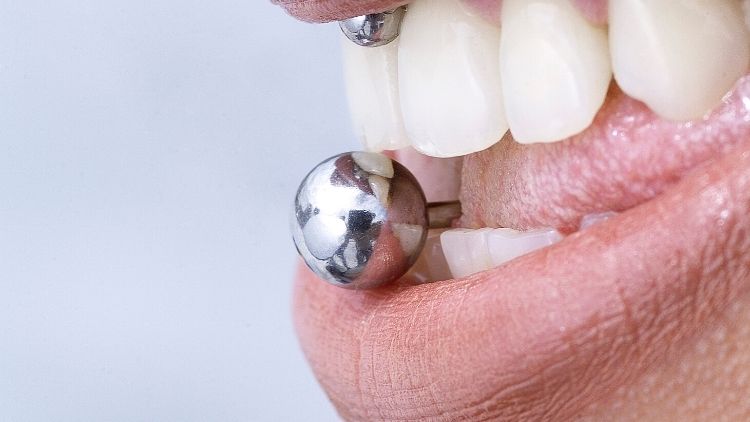Anyone who has piercings in the mouth area runs a health risk. Not only because there is a high risk of infection in the mouth, but also because oral piercing often damages your gums and teeth. Piercings in the mouth area are usually placed on the lips, lip frenulum (the thin piece of skin that attaches your tongue to the bottom of your mouth), tongue, or cheek. But it is precisely here that complications and long-term side effects are common.
Possible Problems with Oral Piercing
First, you might want to consider how sensitive your mouth and teeth are. That’s because that is where lots of blood vessels and nerve endings are. Piercing the tongue or lips can irreparably damage those nerves.
Tongue piercings, in particular, often result in prolonged bleeding and severe swelling. Infections are possible if the piercing was not placed under sterile conditions. Even minor inflammations can lead to painful scars and unsightly growths. Less problematic are the speech and chewing disorders expected immediately after getting a piercing, which, fortunately, subside eventually.
Possible Long-Term Problems with Oral Piercings
The longer you wear oral piercings, the more likely you will cause permanent damage to teeth and gums. This is due to the routine stress caused by the metal parts of the piercing. As with tongue piercings, the metal jewelry repeatedly hits the teeth when speaking, chewing, or playing with the jewelry. This can lead to fine cracks in the enamel of your teeth that can’t be repaired.
Sensitivity to cold and heat, irritation of the tooth nerve, or tooth decay can result. Ceramic dentures are not recommended for patients with tongue piercings due to the high risk of damage.
With lip piercings, the closure of the piercing on the inside of the lip is usually at the level of the gums below the tooth crown. The constant pressure on the gums can cause the gums to recede at this point.
Prolonged exposure can lead to exposed tooth roots, making them prone to damage and injuries, not to mention the underlying bone structure.
Oral piercing jewelry is commonly made of titanium, a precious metal that does not cause allergies. Plastic piercings are also offered. Because they are softer, they should be less harmful to teeth and gums. However, it’s not yet clear how high the allergy risk is with these materials.
Dentists Do Not Recommend Oral Piercings
Because the risk of injury to teeth and gums is high and a pierced lip or tongue is a gateway for infections, piercings in the mouth area are not recommended. Patients should inform themselves in detail about the risks before a procedure. Anyone who still wears piercings in the oral cavity should have their teeth and gums regularly examined by a dentist so that the piercing can be removed immediately at the first signs of damage.
The compassionate crew at Danville Family Dentistry recommends a minimum of two yearly visits to ensure optimal oral health. If you have a piercing you’re worried about, call us today at 317-745-4400, so we can take a look and ease your mind.
Are you on Facebook? We are, too! Let’s be friends!
Disclaimer: The information included in this article is for educational purposes only. It should not be used as a substitute for professional medical advice, diagnosis or treatment.


 (317) 745-4400
(317) 745-4400 info@danvilledentalcare.com
info@danvilledentalcare.com